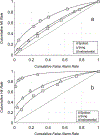Explicit and implicit memory for music in healthy older adults and patients with mild Alzheimer's disease
- PMID: 30173601
- PMCID: PMC6397787
- DOI: 10.1080/13803395.2018.1510904
Explicit and implicit memory for music in healthy older adults and patients with mild Alzheimer's disease
Abstract
Introduction: Previous studies have found that music paired with lyrics at encoding may improve the memory performance of patients with mild Alzheimer's disease (AD). To further explore memory for different types of musical stimuli, the current study examined both implicit and explicit memory for music with and without lyrics compared to spoken lyrics. Method: In this mixed design, patients with probable mild AD (n = 15) and healthy older adults (n = 13) listened to auditory clips (song, instrumental, or spoken lyrics varied across three sessions) and then had their memory tested. Implicit memory was measured by the mere exposure effect. Explicit recognition memory was measured using a confidence-judgment receiver operating characteristic (ROC) paradigm, which allowed examination of the separate contributions made by familiarity and recollection. Results: A significant implicit memory mere exposure effect was found for both groups in the instrumental and song but not the spoken condition. Both groups had the best explicit memory performance in the spoken condition, followed by song, and then instrumental conditions. Healthy older adults demonstrated more recollection than patients with AD in the song and spoken conditions, but both groups performed similarly in the instrumental condition. Patients with AD demonstrated more familiarity in the instrumental and song conditions than in the spoken condition. Conclusions: The results have implications for memory interventions for patients with mild AD. The implicit memory findings suggest that patients with AD may still show a preference for information familiar to them. The explicit memory results support prior findings that patients with AD rely heavily on familiarity, but also suggest that there may be limitations on the benefits that music can provide to recognition memory performance.
Keywords: Alzheimer’s disease; familiarity; implicit memory; music; recognition memory; recollection.
Conflict of interest statement
Disclosure statement
No potential conflict of interest was reported by the authors.
Figures



References
-
- Adjutant General’s Office (Ed.). (1944). Army individual test battery. Manual of directions and scoring Washington, DC: War Department.
-
- Alzheimer’s Association. (2017). Alzheimer’s disease facts and figures. Alzheimer’s Dementia, 13, 325–373. - PubMed
-
- Baird A, & Samson S (2009). Memory for music in Alzheimer’s disease: Unforgettable? Neuropsychology Review, 19(1), 85–101. - PubMed
Publication types
MeSH terms
Grants and funding
LinkOut - more resources
Full Text Sources
Other Literature Sources
Medical
